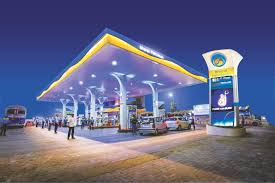
(Photo : BPCL)
Bharat Petroleum Corporation Limited (BPCL) plans to invest $11 billion or approximately ₹90,000 crore in a state-of-the-art refinery and petrochemical complex in Andhra Pradesh. The ambitious project aims to meet India's growing energy and petrochemical demands while contributing to the country's industrial growth, reports said.
The proposed facility in Andhra Pradesh in South India will have a refining capacity of at least 9 million metric tonnes per year. The complex will have an ethylene cracker unit with a petrochemical intensity of 35% at an estimated cost of 900–950 billion rupees, BPCL Chairman G. Krishnakumar told Reuters in an interview. BPCL has already initiated pre-project activities, including land purchases, to expedite the development process.
"We feel there is a big opportunity in the refining sector. India's primary energy demand itself is going to increase three to four times as its economy expands," Krishna Kumar said, adding that 80% of the output from the hub will cater to the demand from south Indian states, which houses major automobile manufacturers and petrochemical developers in the country.
India is positioning itself as a global refining hub, even as Western nations scale back their crude processing capacities amid a transition toward renewable energy. With its young and growing population, coupled with rapid industrial expansion, India's energy consumption is expected to rise significantly in the coming decades.
India is looking to expand its petrochemical refining capacity and strengthen its position as a global supplier in the mid-term, while preparing for its transition to clean energy in the long term. The proposed plant will boost domestic petrochemical production, helping the country to reduce reliance on imports while supporting the growing manufacturing and infrastructure sectors.
The refinery's petrochemical intensity, which is a measure of the proportion of crude oil converted into petrochemicals rather than fuel, also positions it as a forward-looking facility that can cater to the increasing global demand for plastics, polymers, and speciality chemicals derived from the refining process.
Apart from the Andhra Pradesh project, BPCL is exploring collaborative ventures with other companies in both traditional energy and clean energy sectors. The firm is also in talks on establishing a potential joint refinery project with state-run Oil and Natural Gas Corporation in Uttar Pradesh.
The company is expanding its renewable energy portfolio, targeting 10 GW of capacity by 2035, and recently entered a joint venture with Sembcorp Green Hydrogen India Pvt. Ltd. and GPS Renewables Pvt. Ltd. to grow its 300 MW renewable energy base.
BPCL's strategy that balances growth in both traditional and clean energy sectors helps it to remain competitive in a transitioning energy market while addressing the dual challenges of energy security and sustainability.
Once operational, the Andhra Pradesh complex will contribute significantly to regional economic development, enhancing industrial activity while strengthening India's self-reliance in petrochemical production.
As India continues to rely on fossil fuels for its energy needs in the short to medium term, the BPCL refinery could play a pivotal role in bridging the gap between traditional energy sources and the nation's long-term sustainability goals.









